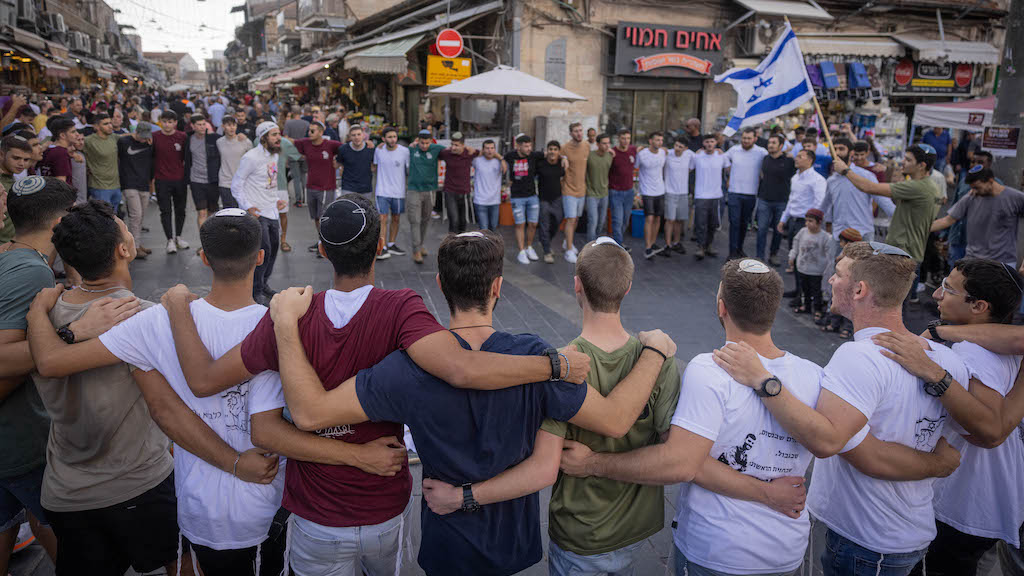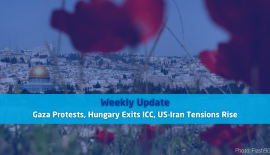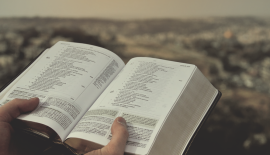From Jerusalem Peace on Earth
Hatred towards Israel is ultimately hatred towards the God of Israel, towards His Messiah, His Anointed One, Jesus, the Christ. It is an unreasonable hate with intense blindness caused by the powers of darkness.
What powers are behind the pro-Palestine protestors who want to violently shut down universities, masked unrecognisably with black balaclavas and garbed with the Palestinian ‘keffiyeh’, the ‘Arafat scarf’? Are some professional paid agitators? Many have come as ‘refugees’ from the Middle East and seeded as aggressive Hamas agitators. They are inspired by a demonic, unbridled Jew-hatred with the aim of wiping Israel from the map of the Middle East and establishing an Islamic State of Palestine in its place, with Jerusalem, the third holy city of Islam after Mecca and Medina, as its capital. Between the River Jordan and the Mediterranean Sea, Jerusalem and the mosques stand on the Temple Mount as its glorious religious centres. “From the River to the Sea, Palestine will be free” is their politico-religious slogan.
“Israel’s history as a nation starts with the Exodus from Egypt”
Miracle
It is a good thing to keep an eye on the bigger picture and to look at the developments in the Middle East from a Biblical perspective. The creation of the new independent State of Israel is God’s miracle, a greater miracle than the Exodus from Egypt and fulfilment of Biblical prophecy. “So then, the days are coming,” declares the Lord, “when people will NO LONGER say, ‘As surely as the Lord lives, who brought the Israelites up out of Egypt,’ BUT they will say, ‘As surely as the Lord lives, who brought the descendants of Israel up out of the land of the north and out of all the countries where He had banished them.’ Then they will live in THEIR OWN LAND.” (Jeremiah 23:7-8).
Worldwide
Israel’s history as a nation starts with the Exodus from Egypt. In those days, 603,555 men aged twenty years and above, not counting the Levites, according to the Book of Numbers 1:46, took off to go to the Promised Land of Israel. So, together with the women and children some one and a half to two million people. But the worldwide return of the Jewish people to Israel in our days is already running into the millions, not only from one country (Egypt) but from all countries worldwide. The prophet Jeremiah says that this miracle will overshadow the Exodus from Egypt. God is faithful to His covenants and promises to Israel and the Jewish people. His plans will not fail. He is starting to move the history of the world forward now towards His goal: the coming of the Messiah of Israel and of His Kingdom of peace and righteousness from Jerusalem all over the world.
“Salvation was, is and shall be from the Jews (John 4:22)”
Blossom
So why have the Jewish people been returning to the Promised Land in our days for decades?
“In days to come Jacob will take root, Israel will bud and blossom and fill ALL THE WORLD with fruit.” (Isaiah 27:6). The Most High has created Israel as a nation separate from all other nations. He has called, chosen, educated and made eternal covenants with Israel and the Jewish people in order to bless all nations of the world through them. Israel is an instrument in His hand to bless the world (Genesis 12:2-3). The Jewish people are returning to the Promised Land to take root, grow, blossom and produce fruit, to bless and serve the nations on the way to world peace from Jerusalem across the world. Salvation was, is and shall be from the Jews (John 4:22).
“Israel will never again be driven out from their Promised Land”
Rebuild
Israel will never again be driven out from their Promised Land. Amos 9:14-15: “…and I will bring My people Israel back from exile. ‘They will rebuild the ruined cities and live in them. They will plant vineyards and drink their wine; they will make gardens and eat their fruit. I will plant Israel in their own land, NEVER AGAIN to be uprooted from the land I have given them,” says the Lord your God.’ Regardless of whatever Israel’s enemies will plan and undertake to prevent this glorious future from happening. Isaiah 11:11-12 says: “It shall come to pass in that day that the Lord shall set His hand again THE SECOND TIME to recover the remnant of His people who are left. From Assyria and Egypt, from Pathros and Cush, from Elam and Shinar, from Hamath and the islands of the sea. He will set up a banner for the nations, and will assemble the outcasts of Israel, and gather together the dispersed of Judah from the four corners of the earth.” The first time the Lord raised His hand to bring the Jewish people back to the Promised Land was during the Babylonian Captivity, between 600 and 500 BC. The second time is now, bringing them back from the Roman Captivity that lasted for almost 1900 years. There will not be a third time that the Lord will raise His hand. Israel is there to stay, waiting for Messiah to come and bring peace and righteousness all over the world from Jerusalem.
Remove Defamation
Today, the Jewish people are still hated and cursed by many people. Jew hatred explodes worldwide. Israel’s enemies dance in the streets of the major cities in the world when Israel is attacked by Hamas and Hezbollah, who are massively inspired by the Islamic leaders of Iran for their murderous attacks.
Then, no more. The Most High will remove His people’s disgrace from the entire earth (Isaiah 25:7-8). Then, the blindness of the nations will also be removed, as there is a shroud that covers the United Nations. That will happen in Jerusalem from Mount Zion and the Temple Mount. All of a sudden, they will see how special the Jewish people and Israel are. God’s people, God’s Land and God’s city where His holy Name will dwell. The blindness of Israel regarding its Messiah will be removed as well (Zechariah 12:10-14). Finally, Peace on earth!
True Peace
“Many peoples will come and say, “Come, let us go up to the mountain of the Lord, to the Temple of the God of Jacob. He will teach us His ways so that we may walk in His paths.” The law will go out from Zion, the word of the Lord from Jerusalem. He will judge between the nations and will settle disputes for many people. They will beat their swords into ploughshares and their spears into pruning hooks. Nation will not take up sword against nation, nor will they train for war anymore.” (Isaiah 2:3-4). Peace on earth! Fulfilment of what the angels were singing (Luke 2:14) when Jesus the Jew was born in Bethlehem!





